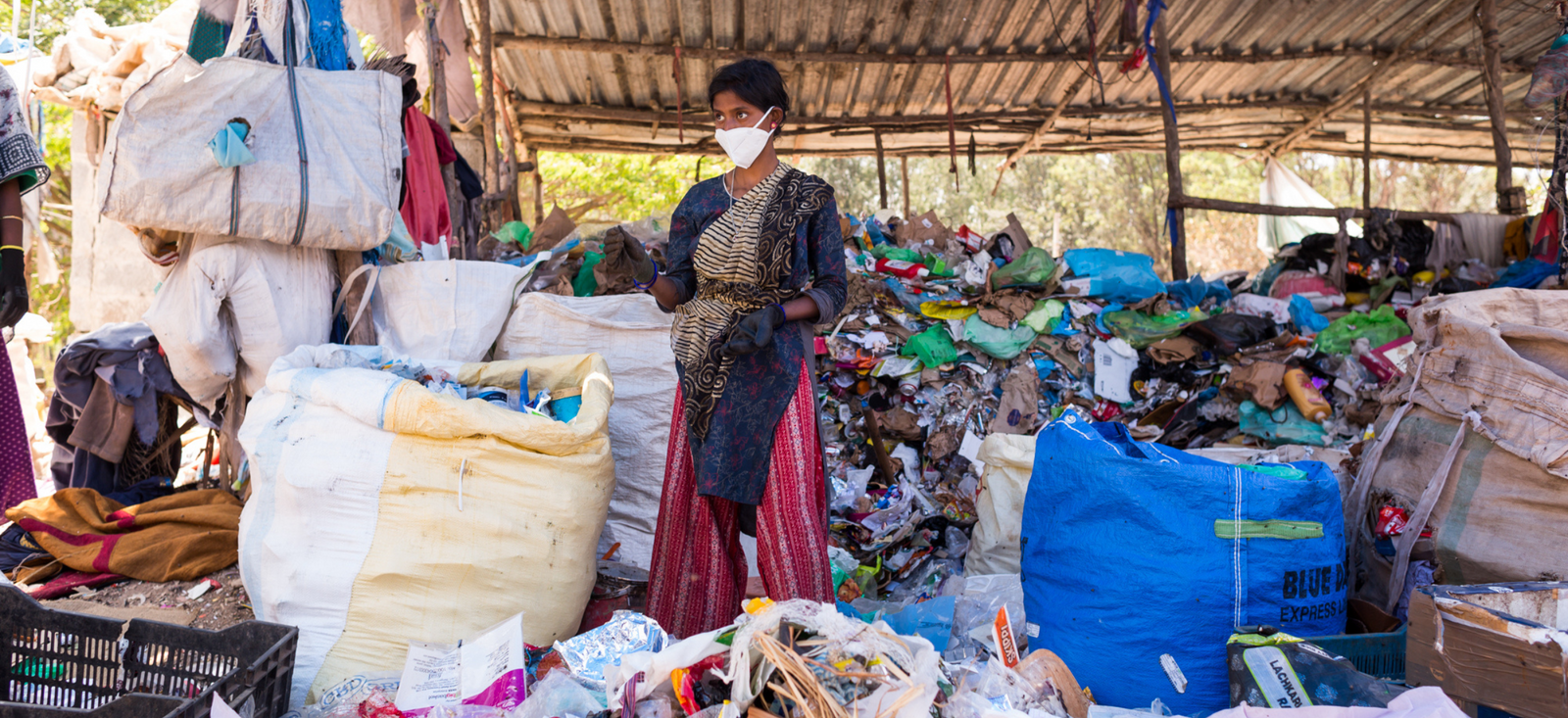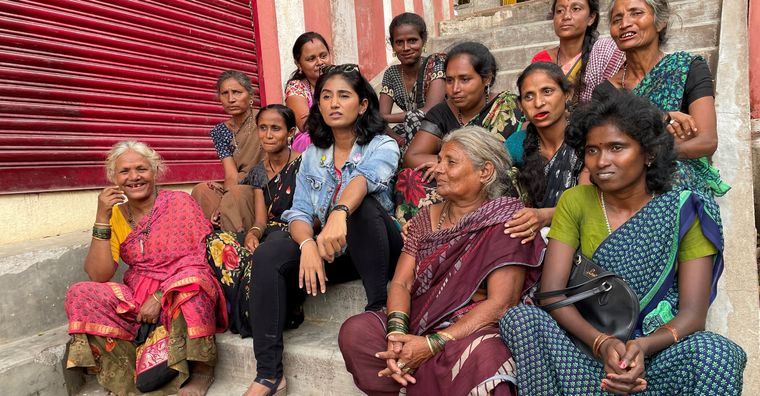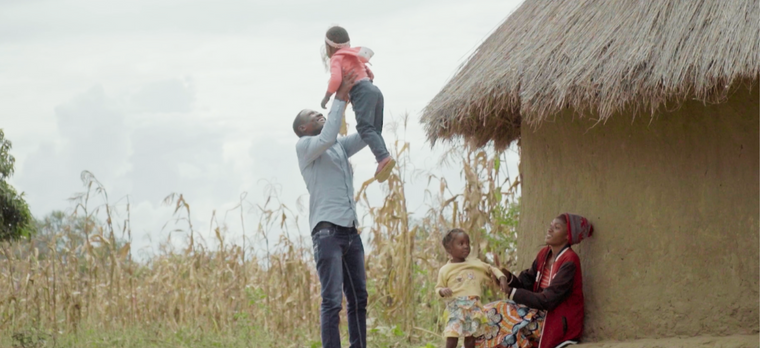Journey from 'Invisible to Invaluable’: Part 1
Invisible to Invaluable – How research and behaviour change communication is helping increase respect for and dignity of waste pickers in Bengaluru, India: Part 1

Article series
Journey from 'Invisible to Invaluable’
- Journey from 'Invisible to Invaluable’: Part 1
- Helping increase respect for and dignity of waste pickers in Bengaluru, India: Part 2
Photo credit: Saamuhika Shakti/Vinod Sebastian
In this two-part article, we look at BBC Media Action’s work with ‘Saamuhika Shakti’, a Collective Impact Initiative, to change how the people of Bengaluru view the city’s waste pickers. Today we’ll provide a summary – including the impressive impact the work had. Tomorrow we’ll discuss BBC Media Action’s methodology and key findings in more detail.
Summary
India’s IT (information technology) capital, Bengaluru, is home to over 22,500 waste pickers and generates over 5757 metric tonnes of solid waste per day[1]. Despite being a critical part of the city’s solid waste management system, the waste pickers suffer many hardships and challenges.
Our formative research shows that while people care deeply about waste on the streets, they don’t recognise the humans behind waste management. The waste pickers remain virtually invisible to the city dwellers, and a strong stigma persists against them. Over half of the respondents, social media-using adult residents from the city of Bengaluru, said that waste pickers are dirty in appearance, and 56% believed that they shouldn’t be allowed in their societies.
To change this, BBC Media Action is working as part of Saamuhika Shakti (The Collective Impact Initiative). This is initiated and funded by the H&M Foundation. The collective’s goal is to:
Enable waste pickers to have greater agency and to lead secure and dignified lives
Have a strong focus on equity
Address the basic needs of marginalised groups such as women and girls (in waste picker households)
All our work and the research that informs it aims to build empathy, respect, dignity and social acceptance within people. The project draws on Professor Judith Butler’s work and the project’s formative research (that was used to design the campaign).
BBC Media Action’s communication campaign has completed two of four phases so far. The first aimed to increase the public’s awareness about waste pickers and their work. The next phase aimed to establish interconnectedness between the public and the waste-picking community.
In the first phase, we created a social experiment film. This was promoted on social media to create awareness about waste pickers and their work. And in the second phase, we designed and created a song called ‘Happy Number’, which celebrated waste pickers and their contribution to the city.
Social media analytics show that the campaign reached 5.1 million unique social media users in Bengaluru by the end of September 2022. Longitudinal research from across two phases of the campaign (#Invaluables and #Invaluablerecyclers) shows that it has:
Helped raise visibility and appreciation for waste pickers
Increased online chatter and discussions about their work
Shifted the perception of waste pickers from being invisible or seen as ‘dirty’ or ‘thieves' to being seen as ‘environmentalists’, ’entrepreneurs’ and ‘valuable recyclers’
Context
Estimates suggest that approximately 20,000-30,000 people are engaged in waste picking in Bengaluru. These people form the backbone of the city’s waste management system[2]. Despite their invaluable contribution to the environment, waste management, society and the economy, waste pickers face significant hardships. This includes stigma and contempt, which leaves them with a sense of shame about their work.
Since the launch of Saamuhika Shakti, a collective working towards improving the lives of waste pickers in Bengaluru, BBC Media Action has launched a phased campaign to address these negative perceptions. The campaign uses a social media mix for sharing content across platforms (Facebook, Instagram, Twitter, YouTube etc.) to highlight the contribution of waste pickers in keeping the city clean.
Formative research conducted at the outset confirmed that for most people in Bengaluru, there was a lack of recognition of the “humans” behind the process of waste management, and there was a high degree of stigma against waste pickers.
From the data, the people in Bengaluru fit into one of three segments based on their attitudes towards waste pickers:
Appreciators - who are grateful for their role in society.
Sympathisers - who display a sense of sympathy but are driven by stereotypes of caste and migration.
Stigmatisers - who distance themselves and have a strong stigma against waste pickers.
Backed by the research learnings, core communication theories and the reading of Professor Judith Butler, the project’s Theory of Change (ToC) was designed. The project’s ToC guided the communication strategy and focused on the shared fragility of all life and the social bond that obliges us to care for each other.
To find out what methodology we used and our key learnings, please read part 2 tomorrow.
Links:
[1] https://www.thenewsminute.com/article/bengalurus-garbage-doubled-last-five-years-city-churns-almost-6000-tonnes-day-102564
[2] https://hasirudala.in/wp-content/uploads/2020/09/Valuing-Urban-Waste-2019.pdf
Varinder Kaur Gambhir
Director of Research, India at BBC Media ActionVarinder Kaur Gambhir is currently working in the capacity of Director of Research with BBC Media Action India. She has over 16 years of experience across India and the UK, both on the agency and programme side. In the last 10 years, her focus has been on generating insights for and evaluating Social and Behavior Change Communications (SBCC) related interventions.
She in the past has held consulting positions with various development organisations (BBC Media Action, IFMR LEAD, USAID, IPE Global) and leading research and insights functions to bring about positive change.
Neema Gupta
Research Manager at BBC Media ActionNeema Gupta is a Research Manager working with BBC Media Action India. She has worked in the sector for 8+ yrs with multiple agencies like Kantar, IFMR LEAD etc.
She is currently leading research for the PRIDE Project, a programme designed to change the perception of waste pickers among the target audiences.
Her favourite thing about research is going to the field and immersing herself in the experience of engaging with target audiences.
Sonal T Chaudhuri
Senior Research Consultant at BBC Media ActionSonal T Chaudhuri, is a senior research consultant at BBC Media Action India. Her research repertoire includes work on social issues such as health, gender, climate change, as well as strategic initiatives for brands.
She has more than 13 years of research experience across both agency and programme-side and has strong applied knowledge of SBCC research. In her current role, she supports research across various projects at BBC Media Action.
Article series
Journey from 'Invisible to Invaluable’
- Journey from 'Invisible to Invaluable’: Part 1
- Helping increase respect for and dignity of waste pickers in Bengaluru, India: Part 2

